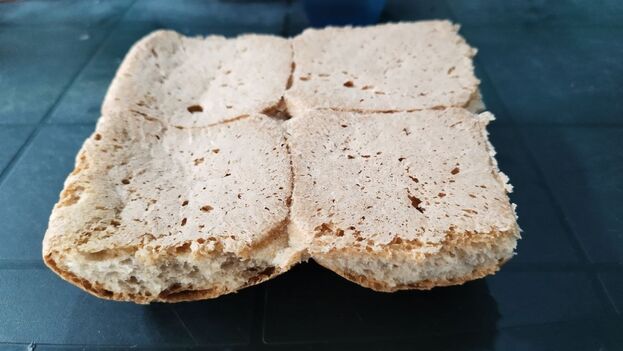
![]() 14ymedio, Havana, 13 January 2023 — Bread bakers in Sancti Spiritus must plan for blackouts and, though wood-fired ovens would solve their problems, they do not see this as a realistic option and are more inclined towards solar panels. This was made clear by an article in the state-run newspaper Escambray about the poor quality of bread in the province, a recurring issue that producers attribute to months of prolonged power outages which have hampered production.
14ymedio, Havana, 13 January 2023 — Bread bakers in Sancti Spiritus must plan for blackouts and, though wood-fired ovens would solve their problems, they do not see this as a realistic option and are more inclined towards solar panels. This was made clear by an article in the state-run newspaper Escambray about the poor quality of bread in the province, a recurring issue that producers attribute to months of prolonged power outages which have hampered production.
Though the worst of the crisis seems to be over for now, the article’s final paragraph alludes to another, future crisis. “There is the possibility that weather events could occur that would cause a total or partial disruption of electrical power in our province,” says Manuel Hung Varela, deputy technical director of the Provincial Food Company.
He believes renewable energy in the form of solar panels could help bakeries maintain a consistent level of production. “This should be the plan going forward because going back to wood-fired ovens is not the solution for the type of high-volume bread production that our company is currently planning for,” he concludes.
Because of its geographic location, Sancti Spiritus is not particularly susceptible to phenomena such as hurricanes, so one assumes he is referring to a different type of electrical disaster. This infers protection against another seemingly endless energy crisis.
Hung Varela indicates that electricity is essential not only for baking but also for kneading. At companies like his, where bread is produced in volume, kneading by hand is not feasible. “Bread production involves three basic steps: making the dough, letting the dough rise and finally baking it. A wood-fired oven could solve the [baking] problem because it would not use electricity. However, the first two steps would be complicated. The dough would have to be made by hand, which only works if you’re talking about small amounts of bread, not when bread must be produced in large quantities. As for the rising, this is also a difficult without electricity,” he points out.
Bread producers believe the worst of the 2022 electrical crisis is behind them. During that period the province experienced planned blackouts that were scheduled to last four to six hours but which in reality went from more ten to a record fourteen hours. Lines of disgruntled customers queuing for bread grew dramatically as production became nearly impossible,
“Making bread is not like frying an egg. It requires time because the production process relies on technology,” production specialist Danay Arruez tells the newspaper.
Yuslén Oliva Gomez, deputy director of production at one a provincial food company, does not shy away from the question about the quality of raw materials. As she explains, Cuban flour is not ideal if the goal is to produce a quality product.
“To make a good bread, you need a hard or semi-hard flour with a gluten content above 25%. Flours, like the domestically produced ones we usually get, are 20% or 18%. These do not produce a high-quality bread. Yeasts are living microorganisms. These are also sometimes of pour quality so the bread doesn’t rise, doesn’t expand, doesn’t grow in volume. It remains flat and looks bad,” she explains.
She rejects the use of flour made from yucca or rice because they result in bad bread. She points out, however, that there are standards that dictate precisely how much of these can be added as “extenders” and with which breads have been made with very good results. The same applies to oil, which does not have an significant impact on flavor. The root of the problem, she insists, is the poor quality of yeast and wheat flour. Then there is the condition of the ovens.
“Most of the ovens in our bakeries are electric. Ovens with twelve electrical resistors are operating on only six or eight. And what we used to be able to bake in twelve minutes now takes thirty-six,” she complains. There is also the problem of heat being distributed unevenly, resulting in loafs in which some parts are raw while others are overbaked.
Ovens, which have been overused for twenty years, were designed to bake 12,500 loaves but currently handle more than twice that. And there are no spare parts.
Nevertheless, she says that things could be worse, noting that other provinces have gone without bread for periods up to four days while Sancti Spiritus has gone without for only two. She also adds that quality has recently improved though individual loaves can sometimes weigh less, which is not legally allowed. “Although the bread’s weight can be one indicator of quality, it will still be be bad if the flour is no good. But it still has to be 80 grams.” Bigger is still better.
____________
COLLABORATE WITH OUR WORK: The 14ymedio team is committed to practicing serious journalism that reflects Cuba’s reality in all its depth. Thank you for joining us on this long journey. We invite you to continue supporting us by becoming a member of 14ymedio now. Together we can continue transforming journalism in Cuba.
